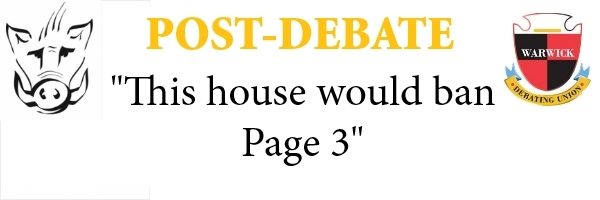“This house would ban Page 3”
Ed Halliday
The argument of Page 3’s defenders goes along predictable lines: ‘This is an authoritarian measure to do away with freedom of the press! They want to cover women up and take Britain back into the dark ages of sexual repression!
There’s much worse out there on the internet!’ Misrepresenting those of us in favour of an editorial ban on Page 3 as being a mix of both Feminazis and actual Nazis appears to be the go-to tactic for handling criticism. When looking at the reality of the situation, however, we can see how fragile these claims are.
Firstly, ‘Ban Page 3’ is an oversimplification of what campaigners are working to achieve. Nobody is seeking a diktat stopping the Sun from printing news. It is up to the Sun to remove age 3, and there are plenty of reasons for them to do it. Page 3 exists as an institution solely for the objectification of women for the sexual titillation of male audiences. Women are sold unattainable, ‘air brushed’ visions of beauty that propagate and reinforce the belief that a woman’s value in society is measured by how big her chest is, while men are encouraged to view women in the same way they would a Lamborghini.
Removing Page 3 is not a blow against women’s liberation. Society should be more open about sex, but this is exploitation. Critics claim that focusing on Page 3 ignores the bigger picture of female subjugation but this is like claiming you shouldn’t spend time working on Alzheimer’s treatments when cancer is more widespread. These arguments ignore the Sun’s reputation as one of the oldest proponents of such discrimination, and to see Page 3 removed would be a symbolic and perhaps watershed moment for the cause.
The last breath of argument comes from members of the Anti-Ban camp who attempt to excuse Page 3 by comparing the photographs of topless glamour models to the nudes painted by Renoir and Klimt. I would happily swap Page 3 for an Impressionist portrait any day, but the gist of the argument goes further to say that Page 3 is the working man’s Venus De Milo. I challenge every reader to try to imagine the Sun having a Page 3 ‘babe’ who was a double amputee. I know, I couldn’t either.
[divider]
Jack Simpson
A free press is one of the defining features of an open and civilised society. There is clearly a strong argument – one that I readily support – that the press needs to operate within some basic legal parameters. However, this differs fundamentally to banning glamour shots, which would set a momentous and highly damaging precedent. Without question, it would suggest that governments are justified not simply in banning material which encourages harm to others, but in taking editorial decisions that ultimately depend on little more than individual taste.
That banning Page 3 would fail to serve any clear public interest is rooted in the fact that there is no evidence that it would tangibly improve women’s experience in society. Undoubtedly, the real factors affecting females’ position in the UK – e.g. the pay gap – would be left completely unaddressed by the ban. It represents the politics of knee-jerk gesture, when complex social dilemmas instead demand a more nuanced response. To suggest that publishing glamour shots of entirely consenting women in some way encourages men to commit acts of sexual violence against females is tenuous at best. Frankly, the idea of banning Page 3 is more a political pet project for a small minority than a reflection of the concerns and priorities of most British women.
It is arguable that Page 3 carries an unfortunate, misogynistic symbolism. However, to suggest that the Sun newspaper seeks to portray females as nothing more than sexualised objects is just not credible. This underlines how unsupported it is to suggest that Page 3 is somehow incompatible with a fully equal role for women in leading our society. Indeed, this is a classic case of something in the media that is relentlessly over-analysed when the reality is much more simple: Page 3 is a harmless bit of fun, with no bearing on the role that one envisages for women in society.
There will be those that reject this argument and persist in their belief that the symbolism of Page 3 is damaging. Even they must recognise, though, that for the government to constrain press freedom and assume the role of judge and jury in questions of personal morality and taste is a heavy price to pay – and one that distracts from the issues directly affecting females today.

Comments